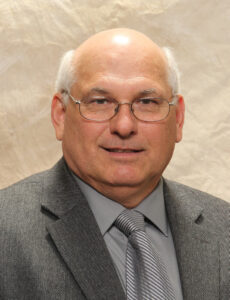Manager | Garrison Diversion Conservation District
Years working in irrigation: 10
Years as manager: 43
Number of employees 32
Size of service area in acres: 7,250
Amount of water diverted for irrigation per year in acre-feet: 6,000–7,000
Main crops irrigated: Beans, corn, potatoes
Predominant irrigation methods: Center pivot
 Irrigation Leader: What is the top issue facing your irrigation district today?
Irrigation Leader: What is the top issue facing your irrigation district today?
Duane DeKrey: Since the Garrison Diversion Project was never finished, one of the major problems in developing irrigation along the 74‑mile, 2,000 cubic-feet-per-second McClusky Canal is the lack of three-phase power. The capital cost of electricity, even at the project power rate, makes it unaffordable for a producer to invest in irrigation.
Irrigation Leader: What future issues are you preparing for?
Duane DeKrey: We are working with the Western Area Power Administration, the State of North Dakota, and local electric co-ops to get affordable electricity to all parts of the canal. We work with the Bank of North Dakota to get loan terms favorable to the producer, and we keep asking for assistance from the state. We are also working with our congressional delegation and the U.S. Army Corps of Engineers to repair the Snake Creek embankment, which holds back Lake Audubon.
Irrigation Leader: What are your top issues regarding personnel?
Duane DeKrey: Our operations and maintenance staff work four 10‑hour shifts and always have a 3‑day weekend. That is popular. We also have the State of North Dakota’s health insurance and retirement plan, which is among the best in the nation. Our turnover is almost all retirements.
Irrigation Leader: What training do you currently provide your employees?
Duane DeKrey: We have a full-time safety coordinator who handles all our safety best management practices. We have a job safety analysis on file for all jobs that our employees perform. We do weekly toolbox safety meetings and have a safety and health committee made up of employees that meets quarterly. We have a drug and alcohol program. We also do training for automated external defibrillator use, first aid and CPR, defensive driving, skidsteer operation, overhead/mobile crane operation, rigger/signalperson duties, noxious weed control, electrical work, and Occupational Safety and Health Administration training.
Irrigation Leader: How much do you spend on training each year?
Duane DeKrey: $44,000.
Irrigation Leader: What kind of safety programs do you have in place?
Duane DeKrey: Lockout/tagout, respirator fit testing, a hearing exposure program, confined space training, the North Dakota Public Employees Retirement System wellness program, and the Sanford Health wellness program.
Irrigation Leader: What is the most important thing you have learned as a manager?
Duane DeKrey: Make sure employees have the personnel, tools, and time to accomplish the work. Don’t have unreasonable expectations. When work issues arise, make sure to be part of the team to assure good outcomes. Emphasize safety; make it known that a good, safe outcome is much more important than saving time or money through a questionable shortcut.
Irrigation Leader: What are the top skills needed to be a successful manager?
Duane DeKrey: Communication: Everyone from the board to the most junior employee should know what we are doing, how, and why. You must be a good listener and give employees as much freedom to do it their way as possible. Be visible: Employees want to see you and know that you are engaged. Don’t only show up when there is a problem. Make sure every employee knows they are valued and invest in them. Identify problems early and don’t procrastinate in solving them. Do not be afraid to terminate a problem or an incompetent employee, because if you don’t, it sets a new low standard and is not fair to the employees that produce every day.
Irrigation Leader: What is the best way to work with a board of directors?
Duane DeKrey: When I was hired, the board members felt they didn’t know what was going on throughout the organization. I instituted what I call a 2‑week blast. The managers; engineering and operations staff; and administration, accounting, and communications departments all give me a bullet-point list of what they have been working on over the last 2 weeks, and all the board members receive a copy.
Duane DeKrey is the manager of the Garrison Diversion Conservancy District. He can be contacted at duaned@gdcd.org.
